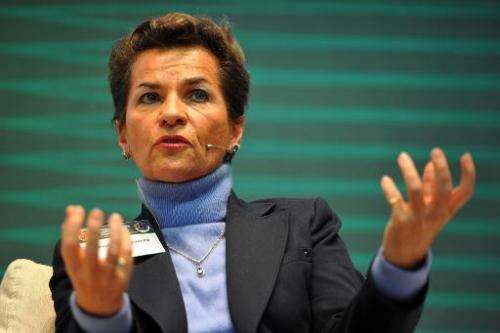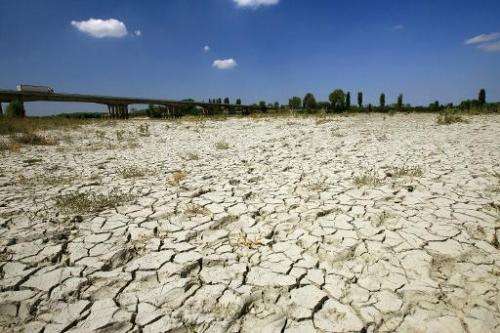Climate talks told to ease rifts as heat busts record (Update)

Fresh UN climate talks opened in Bonn on Monday with a plea for nations to overcome rifts as scientists reported record global temperatures for a month of September.
In an appeal to negotiators at the six-day meeting, UN climate chief Christiana Figueres said renewed commitments made at a world summit on September 23 to curb climate change should prompt negotiators to "build bridges."
Their discussions must lay the foundations for the annual ministerial-level talks to be held in Lima in December, she said.
The Peru meeting, in turn, must pave the way to a pact in Paris in December 2015 that for the first time will bring 195 nations, rich and poor alike, into the same arena of commitment.
"This week is a key opportunity to reach out to your counterparts, build bridges and find a path forward," said Figueres.
The New York summit called by UN chief Ban Ki-moon had "shifted the ground on what is possible in climate change," she argued.
"Collectively, your heads of state have reassured the world that we will address climate change. Today... it is up to you to chart the path of that solution."
The US National Oceanic and Atmospheric Administration (NOAA), meanwhile, said last month was the hottest September since reliable records of global average temperatures began in 1880.
NOAA reported a record for September of 15.72 degrees Celsius (60.3 degrees Fahrenheit)—0.72 C above the 20th-century average.
"With the exception of February, every month to date in 2014 has been among its four warmest on record, with May, June, August and September all record warm," NOAA said.

Negotiators in Bonn face long-standing differences over sharing curbs on greenhouse gases, the source of warming.
These cuts are meant to limit average global warming to no more than 2 C over pre-industrial levels and save the planet from potentially catastrophic climate damage.
Figueres stressed the new climate pact, due to enter into force from 2020, "must irreversibly bend the curb of emissions", which have continued rising.
But many technicalities have to be resolved, including the very legal nature of the pact and how it will be monitored and enforced.
The talks are the first chance for negotiators to discuss a rough 22-page outline for the deal that has been drawn up by working group leaders and distributed for scrutiny in July.
The meeting must also start narrowing down what data countries will be required to provide when they submit their pledges for emissions curbs in the first quarter of next year.
Rich and poor
This topic will likely see negotiators return to a sore point—whether rich countries should have tougher targets because of their longer history of burning fossil fuels.
Developed nations reject the notion, and point the finger in turn at fast-growing emerging giants like China and India.
Prakash Mathema of Nepal, for the 48-nation Least Developed Countries (LDCs) group, said rich countries were "historically responsible" for climate change.
"Industrialised countries must lead the way by demonstrating a high level of ambition on action to reduce their greenhouse-gas emissions and to support adaptation in developing countries," he said.
The LDC bloc, as well as the Association of Small Island States (AOSIS) whose members are threatened by rising seas, want warming to be limited to 1.5 C.
This lower goal is enshrined as an alternative, ideal target for members of the UN Framework Convention on Climate Change (UNFCCC), under whose umbrella the talks are being held.
But more and more experts view even the higher, 2 C target as unfeasible.
The UN's Intergovernmental Panel on Climate Change (IPCC) says that on current trends, the planet could be up to 4.8 C warmer by 2100 and sea levels up to 82 centimetres (32 inches) higher.
© 2014 AFP





















